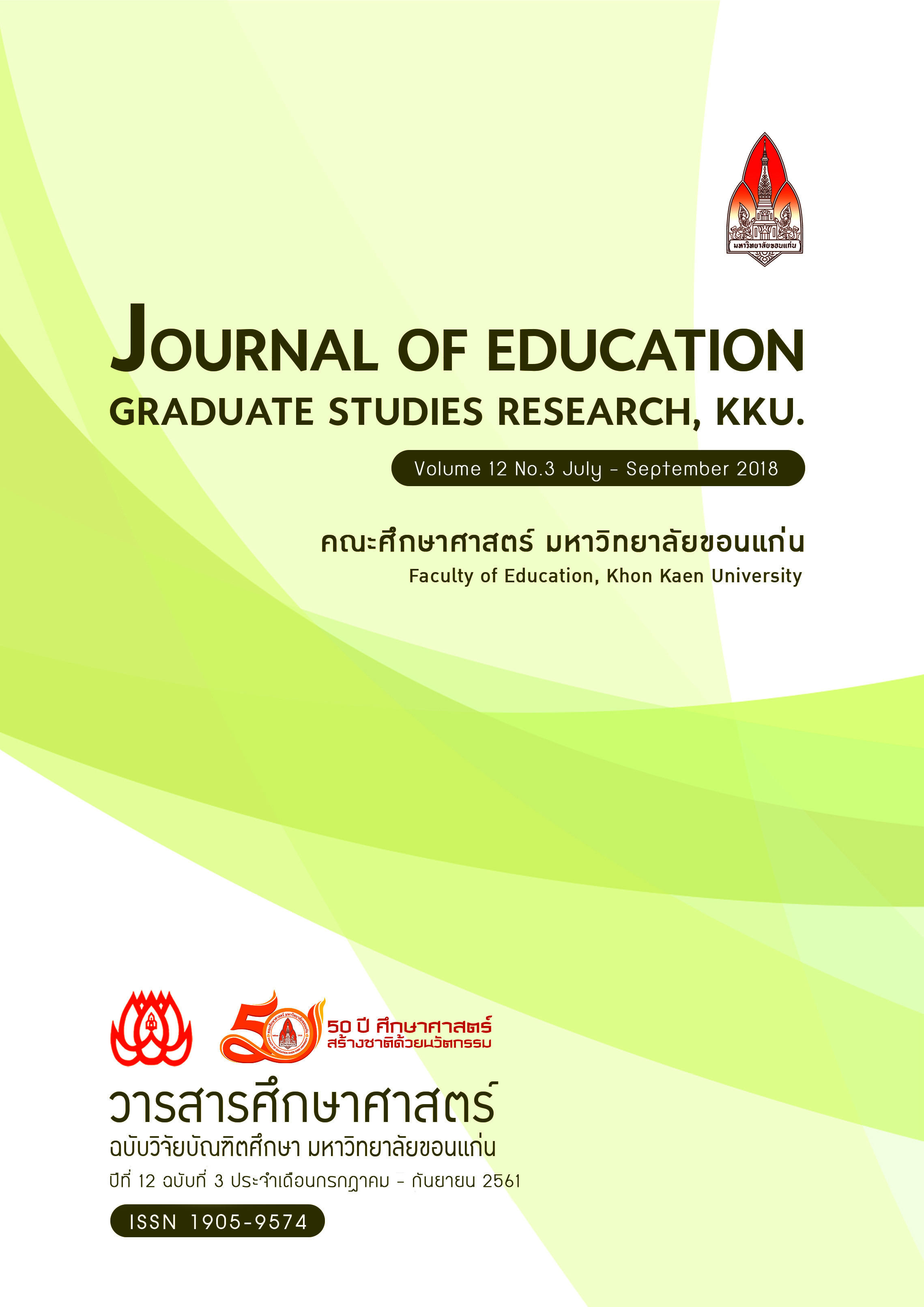The Development of Learning Model Promoting Scientific Argumentation in Secondary Science Classroom
Main Article Content
Abstract
The objectives of this study are threefold as follows: development, study the quality, and document the impact of using a learning model for promoting scientific argumentation within a secondary science classroom environment. The research was implemented in three phases, model development. model validation and model use.
The first phase, model development, was carried out by the use of survey study and document analysis. The sample was composed of 95 teachers and 390 students selected by multi-stage random sampling. The findings revealed that both teachers and students had some cognitive conception and understanding concerning the components of scientific argumentation and claim at different levels: good, fair, poor, and very good respectively. The other components of scientific argumentation such as evidence, reasoning and supportive argument fell into the fair level for both teachers and students.
In the second phase, model validation of the learning model was carried out by the use of experts for internal validation and action research for external validation. The results revealed that the learning model promoting scientific argumentation in the secondary classroom was identified by the researcher in 6 crucial areas, principle, objective, syntax, support system, social system, measurement, and evaluation. There are 5 steps of learning activity, as follows 1) introduce the issues 2) identify the point 3) collection of relevant evidence 4) construct the argument 5) communicate the explanation to others. From the action research used for external validation, it was found that the learning model can develop the scientific argumentative ability of students.
The final phase, model use was implemented by the use of pre- experimental research. It was found that after study using learning model promoting scientific argumentation that the student’s posttest score was significantly higher than their pretest scores.
Article Details
References
บุญใจ ศรีสถิตนรากูร. (2547). ระเบียบวิธีการวิจัยทางการพยาบาลศาสตร์. พิมพ์ครั้งที่ 3. กรุงเทพฯ: ยูแอน์ไอ พริ้นติ้งมีเดีย.
Driver, R., Newton, P., & Osborne, J. (2000). Establishing the norms of scientific argumentation in classrooms. Science Education, 84(3), 287-313.
Erduran, S., Ardac, D., & Yakmaci-Guzel, B. (2006). Learning to teach argumentation: case studies of pre-service secondary science teachers. Eurasia Journal of Mathematics, Science and technology Education, 2(2), 1-14.
Kemmis, S., & McTaggart, R. (1990). The action research planner. 3rd ed. Melbourne: Deakin University Press.
Kuhn, L., Reiser, B. J. (2006). Structuring activities to foster argumentative discourse. Paper
presented at the American Educational Research Association, San Francisco, CA.
Kuhn, D. (2010). Teaching and Learning Science as Argument. Science Education, 94(2), 810-824.
National Research Council. (2013). A framework for K-12 science education: Practices, crosscutting concepts, and core ideas. Washington, DC: National Academies Press.
Osborne, J., & Patterson, A. (2012). Scientific argument and explanation: A Necessary distinction? Science Education, 95(4), 627-638.
Osborne, J., & Chin, C. (2010). Students’ Questions and Discursive Interaction: Their Impact on Argumentation During Collaborative Group Discussions in Science. Journal of Research in Science Teaching, 47(7), 883-908.
Richey, R. C. & Klein, J. D. (2007). Design and Development research. Mahwah, NJ: Lawrence Erlbaum Associates.
Sadler, T. (2006). Promoting discourse and argumentation in science teacher education. Journal of Science Teacher Education, 17(3), 323-346.
Sampson, V., and M. Blanchard. (2012). Science Teachers and scientific argumentation: Trends in practice and views. Journal of Research in Science Teaching. 49(9), 1122-1148.
Sampson, V. (2009). Science teachers and scientific argumentation: Trends in practice and beliefs. Paper presented at the Annual Conference of the National Association of Research in Science Teaching (NARST). Retrieved.
Simon, Shirley. (2011). Argument. In How Science Works: Exploring Effective Pedagogy and Practice. Edited by Toplis, Rob. New York, USA: Routledge.
Simon, S., Erduran, S., & Osborne, J. (2006). Learning to teach argumentation: Research and development n the science classroom. International Journal of Science Education, 28(2/3), 235-260.
Wellington, Jerry; & Ireson, Gren. (2012). Science Learning, Science Teaching. 3rd ed. New York, USA: Routledge.
Zeidler, Dana L.; et al. (2003). The Role of Argument During Discourse About Socioscientific Issues. Edited by Zeidler, Dana L. V. 19. pp. 97-116. Springer Netherlands.

